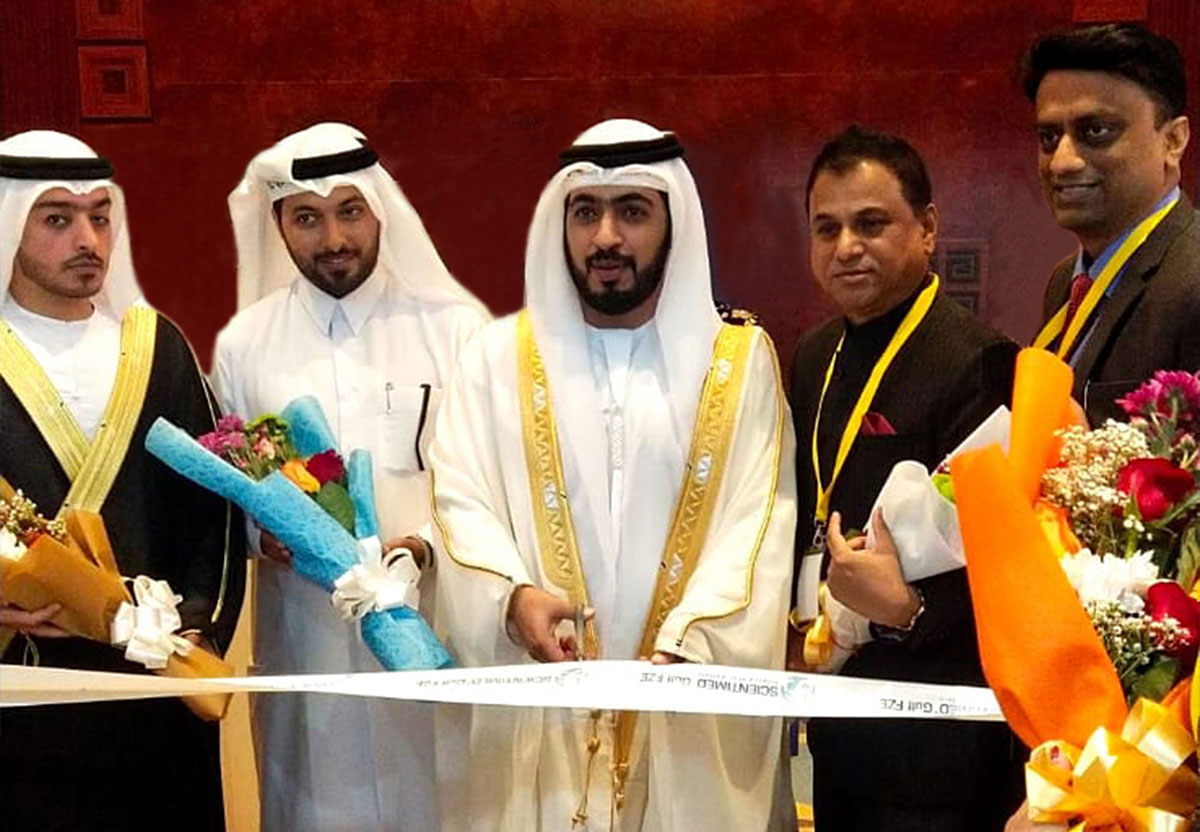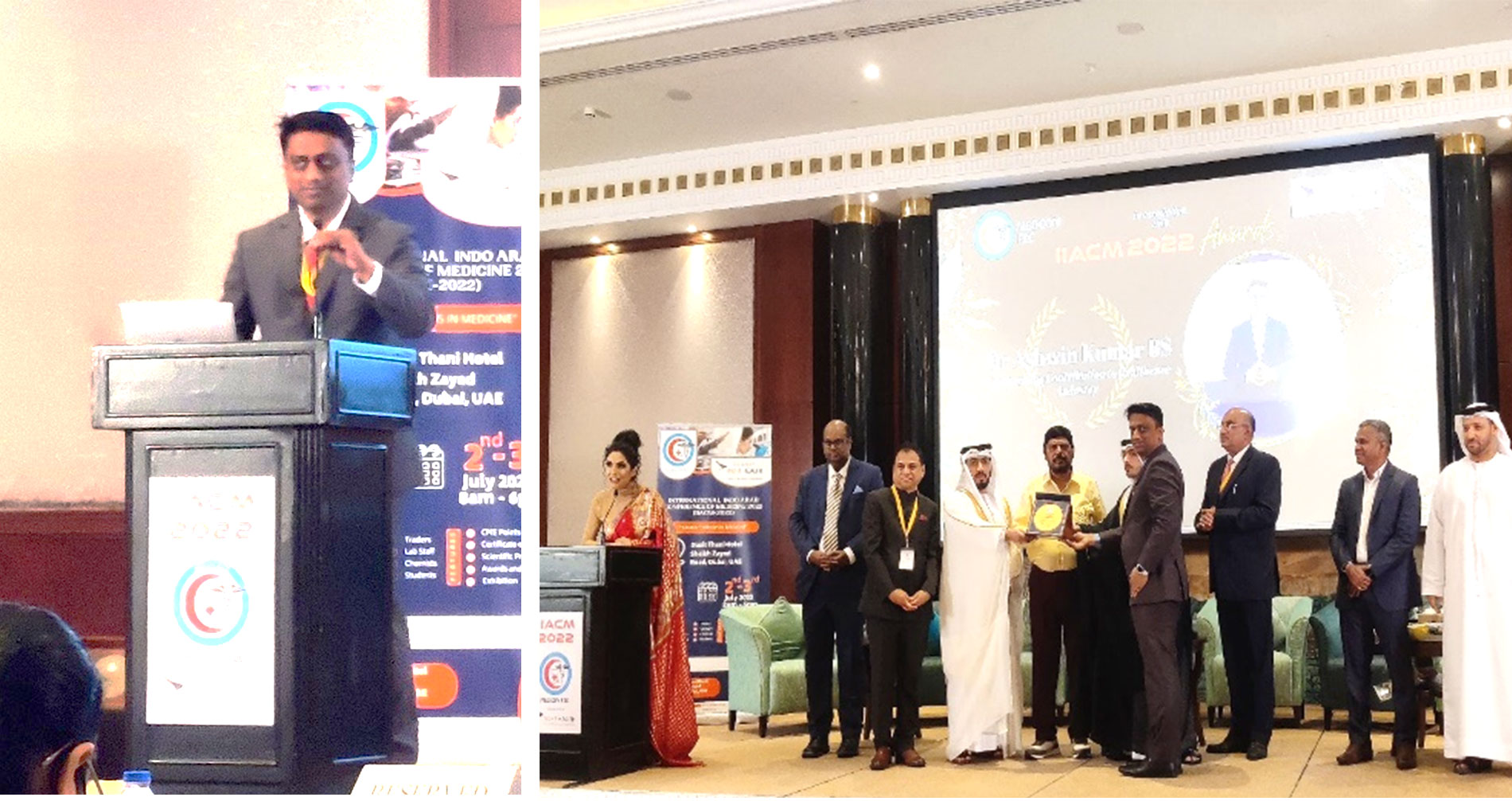
Inauguration of Scientimed Gulf FZE in Dubai, UAE
Scientimed inaugurated a new regional headquarters ‘Scientimed Gulf FZE’ in Sharjah, UAE on 3rd July, 2022 for effectively expanding healthcare services to the Middle East. The inauguration took place during the International Indo Arab Conference of Medicine-2022 sponsored by Medcon FZC at Dusit Thani, Dubai. The event was graced by the presence of esteemed dignitaries HH Sheikh Majid Rashid Al Mualla, the chairman of Majestic Investments, Dubai and Mr. Ramdas Athawale, the minister of social justice and empowerment of India.
As we embark on our journey of expanding med-digital services in UAE, the inauguration of our headquarters in Dubai marks a notable milestone for Scientimed. The healthcare industry in UAE is increasingly embracing technological advancements and innovative services. We look forward to working in this constantly evolving healthcare and pharmaceutical landscape of Dubai. Starting this venture was possible due to unwavering support given by the UAE government to all kinds of healthcare investments in the country. We are honoured and elated for this opportunity of enhancing healthcare and bringing in enriching wellness initiatives across the UAE and beyond.

In addition to the inauguration of Scientimed Gulf FZE, Dr. Ashwin Kumar B. S, the managing director and founder of Scientimed, delivered an enriching lecture on ‘Strengthening Healthcare Communications: Optimizing Digitalization in the Current Era’. He also received an award in recognition for his outstanding contribution to the healthcare industry.
1. Bridging the Knowledge Gap
Medical communication agencies act as intermediaries between pharmaceutical companies and healthcare professionals, ensuring that vital medical information reaches the right audience in a timely manner. Doctors rely on accurate, up-to-date scientific data, clinical trial results, and regulatory information to make informed decisions. By collating, analyzing, and disseminating this complex information in a concise and understandable manner, medical communication agencies bridge the knowledge gap, enabling healthcare professionals to stay abreast of the latest advancements and emerging trends in their respective fields. This empowers doctors to deliver evidence-based care and enables pharmaceutical managers to make informed decisions regarding drug development and marketing strategies.
2. Facilitating Continued Medical Education
Continued medical education (CME) is crucial for doctors to enhance their knowledge, sharpen their clinical skills, and stay updated with the latest medical breakthroughs. Medical communication agencies play an essential role in developing and organizing CME programs, symposia, and conferences. These events provide a platform for healthcare professionals to learn from leading experts, engage in discussions, and exchange best practices. By facilitating CME activities, medical communication agencies contribute to the continuous professional development of doctors, equipping them with the necessary tools to improve patient care and clinical outcomes.
3. Promoting Clinical Guidelines and Best Practices
Clinical guidelines serve as blueprints for evidence-based medical practice, ensuring standardized and quality care across different healthcare settings. Medical communication agencies collaborate with medical societies and expert panels to develop, update, and disseminate clinical guidelines. By effectively communicating these guidelines to doctors, agencies promote adherence to best practices, resulting in improved patient outcomes. Clear and concise communication of guidelines helps doctors make appropriate treatment decisions, reducing variations in care and promoting consistency in medical practice.
4. Effective Dissemination of Research Findings
Cutting-edge research findings and clinical trial results pave the way for medical advancements and improved patient outcomes. However, the translation of complex scientific information into a format that is accessible and understandable for doctors can be challenging. Medical communication agencies possess the expertise to distill and disseminate research findings through various channels, including medical publications, scientific presentations, and digital platforms. By effectively communicating research outcomes, these agencies enable doctors to integrate new evidence into their decision-making processes, leading to improved clinical outcomes.
5. Patient-Centric Communication
Effective medical communication goes beyond interactions between doctors and pharmaceutical companies. It extends to patient-centered communication, where medical communication agencies play a vital role. Patient education materials, brochures, and digital platforms developed by these agencies empower patients to understand their conditions, treatment options, and adherence to prescribed therapies. Clear and concise patient information improves patient compliance, treatment understanding, and overall satisfaction, leading to better clinical outcomes.
In an era of rapid medical advancements and complex healthcare systems, effective medical communication provided by medical communication agencies has a profound impact on clinical outcomes. Through their role in bridging the knowledge gap, facilitating continued medical education, promoting clinical guidelines, disseminating research findings, fostering collaboration, and patient-centric communication, agencies enhance the quality of care delivered by doctors and pharmaceutical managers. By improving access to information, fostering professional development, and promoting evidence-based practices, medical communication agencies contribute to better clinical outcomes and ultimately, improved patient health and well-being of the community as a whole.